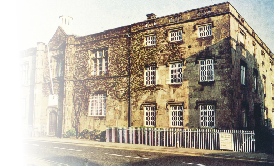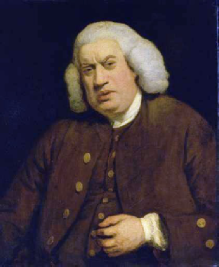




In October, 1728, having just turned nineteen, Johnson entered Pembroke College, Oxford. His mother had inherited a lump sum which was enough to pay for a year at Oxford, and he had the prospect of further aid. But this fell through, and after one year Johnson was forced to leave. Out of Oxford and with no hope of an academic career, for which his natural talents suited him, Johnson sank into a deep depression for two years. A despair and inability to act, wherein, as he later told a friend, he could stare at the town clock and not be able to tell what time it was. He feared that he was falling into insanity, and considered suicide. He developed convulsive tics, jerks, and twitches, that remained with him for the rest of his life, and often caused people, those who did not know him, to think he was an idiot.
In this depressed state, Johnson met the Porters. Mr. Porter was a prosperous merchant. He and his family valued Johnson's company and conversation, and were not put off by his appearance and mannerisms.
From them, Johnson gained renewed self-
The newly-
Johnson’s school closed a little over a year later, having failed to attract enough pupils. He had invested most of his wife's dowry in it, hoping to multiply her capital. Instead, he had lost nearly all of it, leaving them desperately poor. Johnson and Garrick determined to seek their fortune in London. When they arrived, Johnson had twopence halfpenny in his pocket, and Garrick three halfpence.
Johnson began to do small writing jobs for Edward Cave, publisher of The Gentleman's Magazine, the first example of a magazine in the modern sense.
Probably the most easily recognised of all the people associated with the Dixie Grammar School. Even those unaware of his connection to the School will know of Dr. Johnson. But just who was he and what sort of life did he have?
Samuel Johnson was born in Lichfield, on the 18th of September 1709. His father was
a bookseller. As his mother did not have enough milk for him, he was put out to a
wet-
The young Johnson responded to his disabilities by a fierce determination to be independent
and to accept help and pity from no one. Throughout his life, he feared that ill
health would tempt him to self-